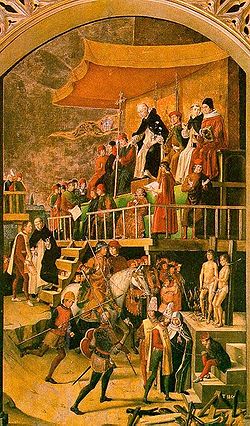Auto de fé: Difference between revisions
No edit summary |
m (Protected "Auto de fé" ([edit=autoconfirmed] (indefinite) [move=autoconfirmed] (indefinite))) |
(No difference)
| |
Revision as of 00:38, 4 February 2010
An auto de fé was the ritual of public penance of condemned heretics and apostates that took place when the Spanish Inquisition or the Portuguese Inquisition had decided their punishment (that is, after the trial). Auto de fé in medieval Spanish (and in Portuguese) means "act of faith". The phrase is used most frequently in English in its alternative Portuguese form auto-da-fé.
In the popular imagination, "auto-da-fé" has come to refer to burning at the stake for heresy.
History
The auto de fé involved a Catholic Mass; prayer; a public procession of those found guilty; and a reading of their sentences.[2] The ritual took place in public squares or esplanades and lasted several hours with ecclesiastical and civil authorities in attendance.[3] Artistic representations of the auto de fé usually depict torture and the burning at the stake.
But, neither torture nor burning at the stake took place during an auto de fé, which was a religious ritual.[2] Torture was not administered after a trial concluded. Executions were always held after and separately from the auto de fe.[4]
The first recorded auto de fé was held in Paris in 1242, under Louis IX.[5] The first Spanish auto de fé took place in Seville, Spain, in 1481; six of the men and women who participated in this first religious ritual were later executed.
The Portuguese Inquisition was established in 1536 and lasted officially until 1821. Its influence was much weakened by the late 1700s under the government of the Marquês of Pombal. Autos de fé also took place in Mexico, Brazil, Peru and Ukraine[6][7]. Contemporary historians of the Conquistadors, such as Bernal Díaz del Castillo, recorded them. They were also held in the Portuguese colony of Goa, India, following the establishment of the Inquisition there in 1562-1563.
Cultural references
Template:In popular culture The auto da fé, usually represented as a heretic being burned at the stake, is a symbol used widely in the arts, especially in Europe.
- Voltaire featured an auto-da-fé held by the people of Lisbon after the 1755 Lisbon earthquake in chapter six of his satire Candide (1759). The people of Lisbon believed that this "great ceremony was an infalliable means of preventing the earth from quaking."
Leonard Bernstein composed and produced a musical adaptation in 1956, featuring a song called "Auto-da-Fé" which included the chorus line "It's a lovely day for drinking and for watching people die", referring to the spectacle of public executions.
- Herman Melville dedicated his novel Confidence Man (1857) to "victims of auto-da-fe."
- Elias Canetti, the Nobel Prize-winning author, wrote a novel Die Blendung (Auto-da-fé) (1935), tr.1946 into English.
- Tennessee Williams wrote a one-act play entitled Auto-da-Fé. (1938)
- Auto-da-fé is in the eponymous lines from Vladimir Nabokov’s novel Pale Fire (1989).
- Sylvia Plath used the term in a recorded version of her poem Fever 103∘ (though not in the published version of the poem). [8]
- Manic Street Preachers compared the coronation of Queen Elizabeth II to "an auto-da-fé" in their song 'Democracy Coma' (on the b-side of Love's Sweet Exile/Repeat) (1991)
- Oriana Fallaci in her The Force of Reason describes herself, being accused and called names, as her own Auto-da-fé [9] resembling that of Mastro Cecco, who was burned at stake for publishing his work on Armillary sphere [10]
- Mel Brooks references the "Auto de fé" in the "Spanish Inquisition" segment of his movie "History of the World, Part I" (1981).
- This term was used by Edgar Allan Poe in the short story, The Pit and the Pendulum.
Notes
- ↑ *Page of the painting at Prado Museum.
- ↑ Jump up to: 2.0 2.1 Peters, Edward. Inquisition. New York: The Free Press, 1988.
- ↑ Many of the public autos were described in contemporary published works listing the dignitaries in attendance, the condemned and their sentences. See for example, Matias de Bocanegra, Auto general de la fee..., Mexico: 1649
- ↑ Kamen, Henry. The Spanish Inquisition : A Historical Revision. London: Weidenfeld & Nicolson, 1997.
- ↑ Stavans 2005:xxxiv
- ↑ Marcus, Jacob Rader (1999). "36". The Jew in the Medieval World: A Source Book, 315-1791. Detroit, MI: Wayne State University Press. pp. 202–203. ISBN 087820217X. http://books.google.com/books?id=PCalmtflYtEC&pg=PA202&sig=xmnwzrCJGAwHTzHeFm8fJf7vV_E#PPA202,M1.
- ↑ Template:Cite journal
- ↑ *Recording of Sylvia Plath reading Fever 103∘ on Youtube
- ↑ Fallaci, Oriana (2004), The Force of Reason (La forza della ragione), epilogue, p. 273-277.
- ↑ Fallaci, Oriana (2004), The Force of Reason (La forza della ragione), prologue, p. 9-11.
References
- Arouet, Francois-Marie (Voltaire) (1758). Candide
- Kamen, Henry. (1997) The Spanish Inquisition : A Historical Revision. London: Weidenfeld & Nicolson.
- Lea, Henry Charles (1906–1907). A History of the Inquisition of Spain (4 volumes). New York and London.
- Nabokov, Vladimir. (1989) Pale Fire. First Vintage International Edition. Random House. New York.
- Peters, Edward. (1988) Inquisition. New York: The Free Press.
- Stavans, Ilan. (2005) The Schocken Book of Modern Sephardic Literature. Random House, Inc. New York
- Steinbeck, John. (1932) "The Pastures of Heaven". Penguin.
- Whitechapel, Simon (2003). Flesh Inferno: Atrocities of Torquemada and the Spanish Inquisition. Creation Books. ISBN 1-84068-105-5
External links
- Jewish Encyclopedia
- Template:Es La Inquisición Española: origen, desarrollo, organización, administración, métodos y proceso inquisitorial
- Template:Wikisource1911Enc Citation
af:Auto de fe br:Auto de fé bg:Аутодафе cs:Autodafé da:Autodafé es:Auto de fe eo:Aŭtodafeo fr:Autodafé gl:Auto de fe it:Autodafé he:אוטו דה פה lt:Autodafė nl:Autodafe ja:アウト・デ・フェ no:Autodafé nn:Autodafé pl:Auto-da-fé ro:Autodafé ru:Аутодафе sr:Аутодафе fi:Autodafee uk:Аутодафе
